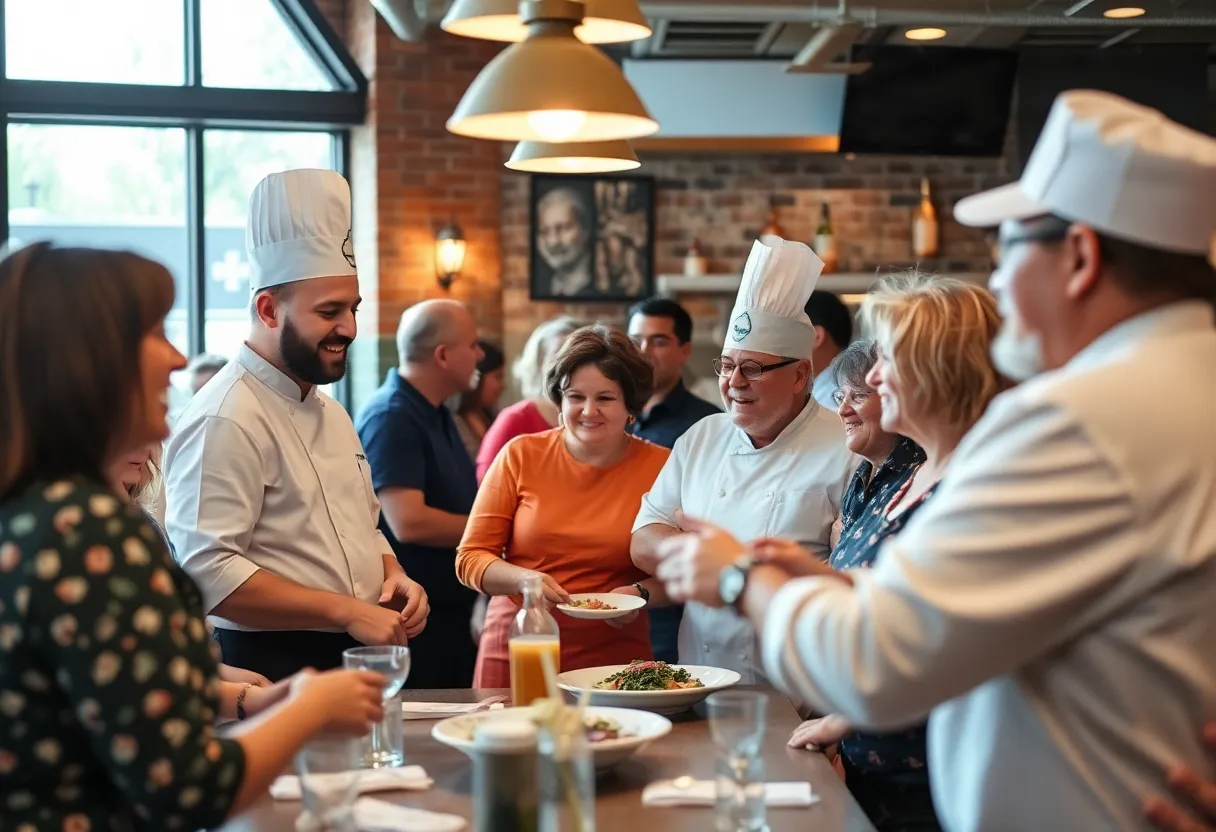News Summary
Asheville’s culinary landscape is rallying together to rebuild after Hurricane Helene’s devastation. The storm caused flooding and disruptions, but the community has shown remarkable resilience and collaboration. Restaurants adapt to new circumstances, focusing on recovery while local food groups provide essential support. Community meetings have fostered cooperation, and organizations like World Central Kitchen are offering free meals. The challenges facing local eateries, including water shortages, highlight the need for disaster preparedness in the hospitality sector. Despite setbacks, the spirit of Asheville’s culinary industry shines through.
Asheville’s Culinary Scene Resiliently Rebuilds After Hurricane Helene’s Devastation
Asheville’s renowned culinary landscape is undergoing a challenging yet inspiring rebuild following the destructive impact of Hurricane Helene. The storm caused significant flooding and disruption in the city, challenging the local food scene that is cherished for its rich Appalachian flavors and farm-to-table dining experiences.
The community has mobilized in response to the storm, demonstrating remarkable resilience and cooperation. Local food groups have stepped up to provide meals and essential supplies to those affected, fostering a spirit of mutual aid. Many residents participated in cooperative self-help efforts aimed at supporting one another during this tough time.
Community Collaboration and Support
In the wake of the storm, community meetings were organized to facilitate discussions and strategize the response to Hurricane Helene’s devastation. Firestorm Books, an anarchist-leaning coffee shop, emerged as a central hub for organizing community efforts and distributing essential resources to those in need. Local residents also took it upon themselves to support the restaurant industry by donating to relief efforts and sharing valuable resources, highlighting a strong sense of unity.
Despite the widespread closures many restaurants faced due to the ongoing absence of clean water and power—critical components for food service—some establishments chose to remain open and help the cause. For instance, Diatribe Brewing Co. prioritized community support over profit by contributing to recovery efforts and adapting operations to fit the circumstances.
Impact on Local Restaurants
The flooding caused widespread restaurant closures, contributing to significant economic strain on Asheville’s tourism, which relies heavily on its culinary offerings. As many restaurants shut their doors due to water issues, those that remained operational pivoted towards take-out services, catering to locals and visitors alike. This adaptability proved crucial for maintaining a connection with customers during the recovery phase.
The community’s resilience was further evident through initiatives spearheaded by organizations such as World Central Kitchen, which set up to provide free meals to those affected. Asheville’s diverse culinary scene showcased various cuisines, underlining a collaborative effort among chefs, farmers, and community members committed to rebuilding.
Challenges and Future Prospects
However, local breweries and food producers have faced challenges, particularly with water shortages impacting beer production and distribution. Many establishments found themselves reallocating resources to assist the community rather than focusing solely on business operations. This environment has not only fostered a sense of kinship among restaurant owners but also uncovered vulnerabilities within the industry, emphasizing the need for greater disaster preparedness in the hospitality sector.
As Asheville’s restaurant owners reflect on their trauma from previous crises, such as the COVID-19 pandemic, there is an underlying hope for recovery and a return to normalcy as soon as water restoration becomes a reality. Residents have been leveraging social media platforms to communicate updated information regarding open businesses and promote local dining options, further supporting the culinary community.
Ongoing philanthropic efforts from local residents and organizations continue to play an integral role in rebuilding Asheville’s food scene. Despite the challenges posed by Hurricane Helene, the community’s response has highlighted the strength and resilience of Asheville’s culinary industry, promising a brighter future for its restaurants.
Deeper Dive: News & Info About This Topic
HERE Resources
Asheville’s Resilient Culinary Landscape After Hurricane Helene
Beloved Asheville Community Member Passes Away
Walmart Supercenter in East Asheville Fully Reopens
Asheville Walmart Supercenter to Fully Reopen After Hurricane Helene
Mama Bear and Cubs Delight Asheville Residents
The Radical Asheville Joins Hilton’s Tapestry Collection
Western North Carolina Tourism Revival Post Hurricane Helene
The Radical Hotel Joins Tapestry Collection by Hilton
Asheville Honors Hospitality Heroes Amid Recovery Efforts
Asheville Begins Recovery After Hurricane Helene’s Floods
Additional Resources
- The Food Section: Hurricane Helene’s Impact on Asheville Food Scene
- New York Times: Asheville Restaurants Post-Hurricane Helene
- Eater Carolinas: Best Restaurants in Asheville
- Charlotte Observer: Resilience of Asheville’s Culinary Community
- AVL Today: Resources for Asheville Food and Beverage Workers
- Wikipedia: Asheville
- Google Search: Asheville food scene
- Google Scholar: Asheville restaurants Hurricane Helene
- Google News: Asheville restaurant recovery

Author: STAFF HERE ASHEVILLE WRITER
The ASHEVILLE STAFF WRITER represents the experienced team at HEREAsheville.com, your go-to source for actionable local news and information in Asheville, Buncombe County, and beyond. Specializing in "news you can use," we cover essential topics like product reviews for personal and business needs, local business directories, politics, real estate trends, neighborhood insights, and state news affecting the area—with deep expertise drawn from years of dedicated reporting and strong community input, including local press releases and business updates. We deliver top reporting on high-value events such as the Asheville Bread Festival, LEAF Festival, and mountain sports tournaments at Biltmore Estate. Our coverage extends to key organizations like the Asheville Area Chamber of Commerce and Explore Asheville Convention & Visitors Bureau, plus leading businesses in hospitality and brewing that power the local economy such as the Biltmore Estate and Sierra Nevada Brewing Company. As part of the broader HERE network, including HERECharlotte.com, HEREGreensboro.com, HERERaleigh.com, and HEREOBX.com, we provide comprehensive, credible insights into North Carolina's dynamic landscape.





